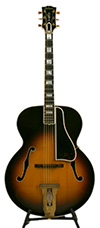This stunning example of Gibson's flagship 17" archtop features
rare bubble maple back and sides, maple neck, and a spruce top. It has
the original ebony fingerboard, adjustable rosewood bridge, and a period
correct replacement pickguard. The original varitone tailpiece is the
fancier, pre-war style which has more ornate engraving than the simpler
post-war versions. The Kluson sealfast tuners are original, but the
buttons have been replaced with period correct ones (the original,
degraded buttons are in the case.)
This
flagship model was the premiere choice for guitarists during jazz' Golden
Age. This particular instrument was purchased new in 1945 by the
illustrious Syracuse based guitarist Carlo Mano. Carlo concertized
extensively in the NY area, using this instrument with his Carlo Mano
Trio. Interestingly, Carlo was also an accomplished classical guitarist
who studied with Rey De La Torre, Eduardo De La Maza, and Andres
Segovia. An active teacher, many of Carlo's students are still concertizing. After Carlo's passing in 1986, this instrument was
lovingly cared for by Carlo's grandson.
The Factory Order Number for this guitar is 2576. This is a rather
early number from a series that ranged from 1-7900 used between 1940-1945. Although
the serial number indicates the guitar was shipped in 1945, the low FON
number suggests construction began as early as 1941, which would explain
the pre-war characteristics of this instrument.
The
clear, warm tone of this instrument served Carlo well throughout his
long career. This is one of the driest sounding archtops I've come
across, producing almost no overtone ringing or "wetness" of any kind.
Each note has a very strong fundamental, with lots of woodiness and
definition. Consequently, it is a superlative rhythm guitar as the
chords are crisp and snappy, with each voice clearly audible. Single
note playing is a joy, as the guitar responds evenly across the entire
fingerboard with a pleasant roundness of tone.
This
instrument is in excellent condition with no cracks or other structural
damage. It did have a DeArmond pickup mounted to the fingerboard at one
point, so the two small screw holes are still visible from the side. The
guitar was sent back to the Gibson factory in Kalamazoo sometime in the 1970s and refinished with a period
correct color pallet. It looks to also have been refretted by Gibson,
using extra wide frets that were common at that time.
Here's a chance to own a titan of the jazz age, the legendary L-5 in immaculate condition. This one could be yours, call now!
This is the CASH price...add 3% (4% for International orders) if you'd like to pay with a credit card.
 Gibson
One owner, pre-war style, rare bubble maple in breathtaking condition!
Arts & Entertainment
1945-gibson-l5
L-5
View Offer
DjangoBooks.com
https://www.djangobooks.com/Item/1945-gibson-l5
Gibson
One owner, pre-war style, rare bubble maple in breathtaking condition!
Arts & Entertainment
1945-gibson-l5
L-5
View Offer
DjangoBooks.com
https://www.djangobooks.com/Item/1945-gibson-l5
 Gibson
One owner, pre-war style, rare bubble maple in breathtaking condition!
Arts & Entertainment
1945-gibson-l5
L-5
View Offer
DjangoBooks.com
https://www.djangobooks.com/Item/1945-gibson-l5
Gibson
One owner, pre-war style, rare bubble maple in breathtaking condition!
Arts & Entertainment
1945-gibson-l5
L-5
View Offer
DjangoBooks.com
https://www.djangobooks.com/Item/1945-gibson-l5